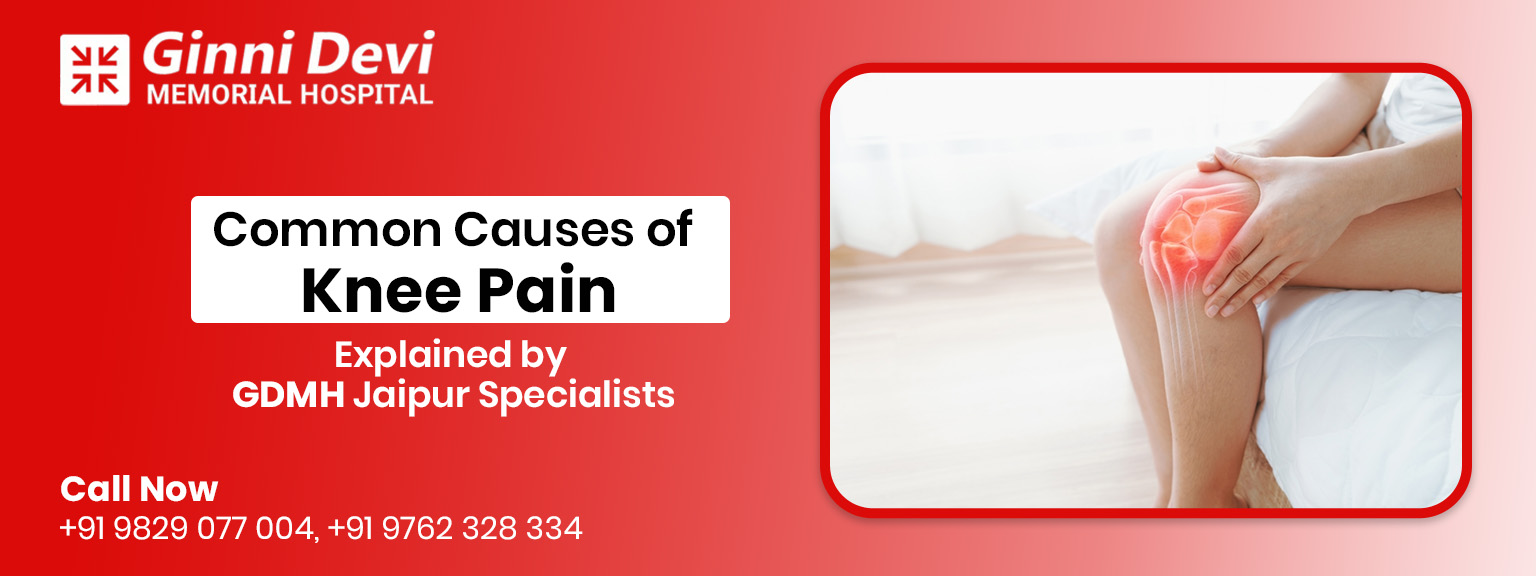Knee pain is one of the common problems that is experienced by people of all ages. It can make anything you do hard, whether it is a jolt of pain as you walk or a constant dull ache while at rest. But what causes this pain? With the assistance of our skilled GDMH Jaipur experts, we can help you identify the root causes of your knee pain and how to manage it effectively. Here, with the proper diagnosis and care, you can be comfortable and active again. In this blog, we will talk about the most likely reasons for causes of knee pain, explained by GDMH Jaipur Specialists.
Causes of knee pain
Knee pain is not just a problem for older people. Many times, due to various situations, it can happen to anyone. Here are the common causes of knee pain:
Osteoarthritis (Cartilage Damage)
This occurs most commonly in older individuals. The bones in our knees are covered with a soft layer, called cartilage, which makes it easier to move smoothly. This layer wears away with age or use. When this happens, bones can rub against each other to cause pain. You might experience stiffness, swelling, or pain when you walk or stand.
Ligament Tears (ACL, MCL)
Your knee contains powerful bands called ligaments that keep the bones of the joint in place. If you twist your knee suddenly or fall while playing sports, these bands can rip. You may hear a popping sound, and the knee could swell or feel weak.
Meniscus Tears (Cartilage)
Inside your knee, there is a special type of cushion that helps absorb the pressure, which is called the meniscus. It can tear if you twist your knee suddenly or lift something heavy. The knee could be painful, swollen, or feel like it’s getting stuck when you move.
Patellar Tendinitis (pain below the kneecap)
If you jump a lot, run frequently, or overuse your knee, that tendon beneath your kneecap can become inflamed. This is called jumper’s knee. Pain is located beneath the kneecap and is most noticeable when climbing stairs and jumping.
Bursitis (Inflammation of Knee Sacs)
The knee contains small, fluid-filled sacs called bursae. These help to cut down on friction between bone and skin. Bursitis occurs when these become swollen from kneeling or injury. You may feel warm, see swelling, and experience pain in the knee.
Rheumatoid Arthritis (Inflammation of the Body’s Joints)
This is a condition in which the body’s immune system mistakenly attacks the joints. It leads to long-term pain and swelling. The person may experience stiffness and pain in both knees, especially in the morning.
Overweight or Obese (Excessive Pressure on Knees)
The heavier you are, the more load your knees have to carry. This can pressure the cartilage and cause the knee to hurt more in the long run. You might experience knee pain even when standing or walking for short distances.
Fractures (Broken Knee Bone)
You could break the bones in your knee by falling or having an accident. The risk is higher in older people whose bones are frail. It triggers sudden, sharp pain and swelling. You might not be able to move the knee.
Dislocated Kneecap (The kneecap is out of place)
The round bone in front of your knee is the kneecap. Occasionally, an injury may allow it to slide out of its usual position. The knee might appear will appear strange, swell, and the pain will be excruciating.
Prolonged Use (Too Much Activity Without Rest)
Depending on your knee, if you use it, it looks like climbing stairs, standing for hours, doing the same thing over and over again, and more. In this, you might have a dull ache or a sensation of tightness in the knee.
Why choose Ginni Devi Memorial Hospital for knee pain in Jaipur?
At Ginni Devi Memorial Hospital (GDMH), we go beyond just treating knee pain—we focus on identifying and addressing the root cause of your discomfort. Our expert team, including some of the best knee replacement surgeons in Jaipur, along with skilled doctors and physical therapists, ensures that every patient receives timely and accurate care.
We use advanced diagnostic tools such as MRI, X-rays, and ultrasound to assess your condition precisely. Based on your diagnosis, we design individualised treatment plans tailored to your specific needs. For those requiring surgery, we offer minimally invasive surgical options that promote faster recovery and less post-operative pain. Our comprehensive approach also includes dedicated aftercare and physiotherapy, helping you regain mobility and strength effectively. Additionally, we provide affordable treatment packages, making quality orthopedic care accessible to all.
As a trusted Orthopedic hospital in Jaipur, GDMH is committed to delivering excellence in knee pain treatment and joint care.




